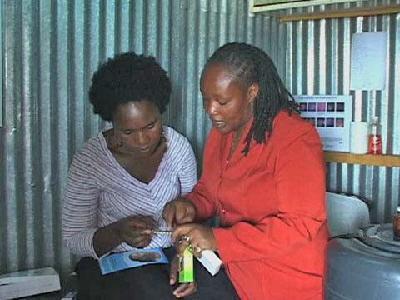
This is the VOA Special English Health Report.
Translators Without Borders is an American nonprofit group. It provides language services to nongovernmental organizations such as, yes, Doctors Without Borders. The group recently trained some new translators in Nairobi in how to put health information into local languages for Kenyans.
For health translators, finding the rights words is not just about language but also culture.
Muthoni Gichohi is a manager for Family Health Options Kenya, the group that organized the training. She says she has no problem expressing the names of body parts in English. But as a Kikuyu she says there are some words in her first language that may be "provocative" if she said them in public.
MUTHONI GICHOHI: "So I have got to really put it in another way that it is still delivering the same message, but the words will be different."
Trainer Paul Warambo says the same issue arises with Kenya's national language.
PAUL WARAMBO: "Sometimes you are also forced to use euphemisms -- use a language that is more acceptable to the people. For example, in Swahili, we will not call a body part -- the vagina, for example -- we will not call it by its name. We use kitu chake --- her thing. You do not just mention it by the name, you say 'her thing.'"
The culture of a community will largely decide how words and expressions are translated into socially acceptable language.
In some cases, the way people in a culture think about an activity or object becomes the translated name for that activity or object.
Paul Warambo explains how the term "sexual intercourse" is commonly translated from English into Ki'Swahili.
PAUL WARAMBO: "We always say, in Ki'Swahili, 'kutenda kitendo kibaya' -- to do something bad. So, imagine sex was associated with something bad, emanating from the African cultural context."
Whether or not a community will accept or even listen to a message is especially important in health care.
Lori Thicke co-founded Translators Without Borders in 1993. She says, in general, a lot of development organizations have often overlooked the importance of language in changing health behavior.
LORI THICKE: "It is true that people do not think of translation. It is absolutely not on the radar, but it is so critical if you think about it, for people to get information, whether it is how to take their medication, whether it is where to find supplies in a crisis situation."
Muthoni Gichohi and her team recently opened a health information center in a Maasai community. She learned that young Maasai cannot say certain things in the presence of elders. Also, men are usually the ones who speak at public gatherings, so people might not accept a message given by a woman.
And that's the VOA Special English Health Report. I'm Faith Lapidus.
Translation errors cause disputes over contract terms
Drought threatens Turkana way of life in Kenya
Growing global appetite for meat, milk presents health risks
(来源:VOA 编辑:旭燕)
关注和订阅


电话:8610-84883645
传真:8610-84883500
Email: languagetips@chinadaily.com.cn